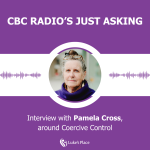Understanding Coercive Control: A Conversation with Pamela Cross
On a recent episode of CBC Radio’s Just Asking with Saroja Coelho, feminist lawyer and advocate Pamela Cross joined the conversation to talk about a form of abuse that’s all around us, but still largely invisible: coercive control.
Pamela Cross brings decades of experience to this issue. She’s a member of Ontario’s Domestic Violence Death Review Committee, the former Legal and Advocacy Director at Luke’s Place, and the author of And Sometimes They Kill You: Confronting the Epidemic of Intimate Partner Violence.
Coercive control is a term used by psychologists, family courts, and frontline advocates to describe a pattern of controlling, abusive behaviour, surveillance, isolation, manipulation, threats, that aims to strip away a person’s independence and sense of self. It’s not always physical, but it is always dangerous.
Yet, despite its serious impact, coercive control has no legal definition under Canada’s Criminal Code. A bill aimed at criminalizing it made it to the Senate earlier this year, but Parliament was prorogued before it could move forward. The bill must now be reintroduced in the House of Commons.
So what would it actually mean to criminalize this form of abuse? What do survivors need, beyond legal reforms? And how can we make sure support systems truly reflect the lived realities of coercive control?
Pamela Cross explores these questions in a thoughtful conversation with Coelho, alongside Carrie McManus, Director of Innovation and Programs at Sagesse, a domestic violence prevention organization in Calgary.
To listen to the whole conversation: CBC Radio: Coercive Control
It’s a vital listen for anyone who wants to understand coercive control and the fight to name, prevent, and respond to it.

